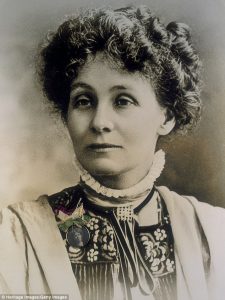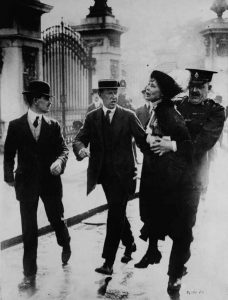Emmeline Pankhurst (1858-1928)
“We are here, not because we are law-breakers; we are here in our efforts to become law-makers“
Women across Europe had few civil and political rights during the long nineteenth century. Emmeline Pankhurst (1858-1928), née Goulden, fought her whole adult life against the discrimination of women. She became one of the most prominent figures advocating for women’s suffrage in the United Kingdom and was the founder and leader of the militant Women’s Social and Political Union (WSPU).
Emmeline Pankhurst was born in Moss Side near Manchester in July 1858 to middle-class parents, who were politically very active. With the support from her middle-class parents, she had access to a private education that involved boarding schools, governesses, and day schools. However, this education emphasized the traditional female role as a perfectly poised, educated companion for men. Despite the limitations of her education, at fourteen Pankhurst became interested in politics through her mother’s access to the Women’s Suffrage Journal. She also moved to Paris, France in 1872 to receive a higher education at École Normale. There she earned an education that included not only traditional courses for women, but also ones in the sciences and bookkeeping. The support from her parents as well as her education created a political consciousness in Emmeline Pankhurst.
Emmeline Pankhurst feared marriage and its limitations. Based on British law, married women lost all their property, money, and other rights to their husbands. In spite of her reservations, at the age of twenty-one, Pankhurst decided to marry Richard Pankhurst (1835-1898), who was an English barrister, socialist and strong supporter of women*s rights. He was twenty-three years her senior. As a couple, they had five children of whom three would later become politically active. Since she was married, society expected her to follow the traditional roles of motherhood and companionship. However, Pankhurst decided she would not let her roles as a mother and wife keep her from being a political activist. This was only possible because her husband supported social reform and the women’s movement. Richard Pankhurst became one of her great supporters, and ultimately let her pursue her interests.
With her educational and activist background and the support from her husband, Emmeline Pankhurst became the leader of the British suffragette movement. In 1903, she founded the Women’s Social and Political Union (WSPU), an organization with the primary focus of obtaining women’s suffrage. In their attempt to gain women’s suffrage, the organization began to use militant tactics. In some cases, they would smash windows and assault police officers, but they would not harm civilians. Pankhurst strongly believed that militant tactics would help them make society pay attention to the women and their demands.
In her choice of tactics, Pankhurst was unwilling to compromise with others, giving her many obstacles to overcome. Firstly, the British government did not support this particular women’s organization and despised the WSPU’s militant tactics because they strongly believed that the women were not behaving according to the expectations of their gender. Because of her constant use of militant tactics, Pankhurst was given repeated prison sentences, usually involving harsh conditions regarding hygiene and space. Even while in prison, she orchestrated hunger strikes in order to protest prison conditions. Pankhurst was strong-willed and believed women should fight to obtain rights in any way they could, regardless of the effects to their health.
Despite her strong desire to obtain women’s rights, Emmeline Pankhurst and Christabel Pankhurst (1880-1958), her daughter and the new prominent leader of the WSPU, decided to change their agenda as World War I approached. They mainly wanted to support the British government as they opposed Germany. To support the war effort, Pankhurst began to organize rallies, deliver speeches, and lobby for the British government and the war effort. Yet she never neglected her dedication to supporting women and advocating for their rights. During the war, she supported British women who joined the industrial production and raised young children without the support of their fathers who were at war.
Emmeline Pankhurst’s strong determination to obtain women’s rights shows that despite the difficulties and societal norms of the time, a woman can achieve a great deal. She is a great example of a woman’s strong-will. Her radical ideas, such as the hunger strikes and the militant tactics, represent her ability to look outside the box and create new forms of protest without harming civilians. These methods drew the public to pay attention to women’s actions. In a way, Pankhurst found the agency to organize many women, who without her guidance might never have been inspired to leave their homes in pursuit of their rights.
Carina Ochoa, Chemistry and Women’s and Gender Studies, Class of 2018
Sources
Literature and Websites
- “Emmeline Pankhurst.” Biography, at https://www.biography.com/people/emmeline-pankhurst-9432764 (Accessed 9 April 2018).
- “Emmeline Pankhurst.” Wikipedia, at https://en.wikipedia.org/wiki/Emmeline_Pankhurst (Accessed 9 April 2018).
- “Emmeline Pankhurst ‘Why We Are Militant’ in Lives and Voices: Sources in European Women’s History, ed. Lisa DiCarpio and Merry E. Wiesner, 387-392. Boston: Houghton Mifflin Company, 1982.
- Bartley, Paula. Emmeline Pankhurst. London and New York: Taylor & Francis Group, 2012.


